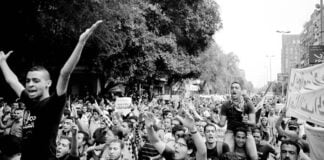Review: The Idea of Communism
By Tariq Ali, University of Chicago Press, $22.95
More like a long pamphlet than a book, The Idea of Communism, the first of a series edited by Tariq Ali, is a welcome defence of the idea that there are alternatives to capitalism.
It was published last year to coincide with the 20th anniversary of the fall of the Berlin Wall. As Ali states, “Capitalism appears more like a nervous disease these days than a triumphal, over-confident system generating unchallengeable ideologies to buttress and further its victories.”
Ali stresses that some form of socialism is crucial if we want to save the planet from recurring economic crises and impending climate catastrophe. He defends the idea of history as a grand narrative, and takes us from the Haitian slave revolt to critiques of 21st century capitalism by the likes of Mike Davis and Naomi Klein.
His rather whimsical opening ponders whether humanity can learn from certain Pakistani and South American species of “social spiders”, which construct web “communes” to hunt, eat, and even look after each other’s young. These spiders, he writes, “have existed for at least half a million years and there have been no assaults on them by more individual-oriented spiders”.
The book’s first section is the best, tracing the roots of the ideas and events that led Karl Marx and Friedrich Engels to write The Communist Manifesto in 1848. Ali stresses that whereas the idea of freedom came as a response to slavery, the idea of “Communism” emerged in response to the “wage-slavery” of industrial capitalism.
Ali quotes liberally and approvingly from Marx’s account of the Paris Commune in 1871, the event that came closest in Marx’s lifetime to realising the Manifesto’s ideals of a socialist republic.
Ali also strongly defends the Russian Revolution. He describes its massive global impact—transforming the audience for socialism to millions of people, threatening empires, and bringing to life “the spectre of which Marx and Engels had written in the Communist Manifesto”.
Revolution in underdeveloped Tsarist Russia was the polar opposite of Marx’s prediction of it happening first in the most industrially advanced nations. But Ali highlights Lenin and Trotsky’s insistence that the revolution would only survive if it spread elsewhere; “socialism in one country” wasn’t possible.
By contrast, after 1927, Stalin and the state bureaucrats that provided his support base acted like “sterile, doomed creatures”. Ali points out that Stalin killed more communists than did the Tsar.
Stalinist Russia
Ali’s discussion of the nature of the Soviet Union under Stalin and his successors reflects his orthodox Trotskyist outlook that Russia was a “deformed workers’ state”. He maintains that because there was no restoration of the free market, Stalin’s counter-revolution was at the level of the “political superstructure of the state”. He undercuts his own criticisms of Stalinism by claiming that the “social and economic conquests of the revolution were not simply preserved; they were, in reality, strengthened”.
He dismisses attempts to characterise the Stalinist bureaucracy as a new ruling class, arguing such theorists invariably ended up as right-wing Cold War defenders of US imperialism. Similarly, Ali tries to shrug off Tony Cliff’s theory of state capitalism (and Cliff’s insistence that without workers’ power there can be no workers’ state) in a few lines, although he does recognise that Cliff “remained an intransigent revolutionary committed to the victory of socialism”.
Curiously, Ali seems unable to make the connection between the triumph of Stalinism and the outcomes of the Yugoslav, Chinese and Vietnamese revolutions. He wonders whether it is “a pure accident that every single revolution has resulted in a monolithic state, with the very partial exception of Castro’s Cuba.” One can only concur with his conclusion that any future revolution will need to ensure mass democratic participation.
He finishes the book with a brief discussion of what socialism might look like in the 21st century and the need for a “socially just economic structure coupled with a radical political democracy.” He is optimistic about events in Latin America, but seems less convinced than he was in the 1970s that future socialist revolutions will come as a result of the “self-emancipation of the working class”.
Ali’s good intention of keeping the idea of communism alive is marred by how much of the book is devoted explaining away Stalinism’s role in the obvious triumph of capitalism in Russia and China. However, the book does include an illustrated pullout of Bertolt Brecht’s beautiful 1932 poem, “In praise of Communism”, which in part states:
“The exploiters call it a crime but we know:
It is the end of crime
It is not madness, but the end of madness.
It is not the riddle but the solution
The simplest thing so hard to achieve.”
By Mark Goudkamp





